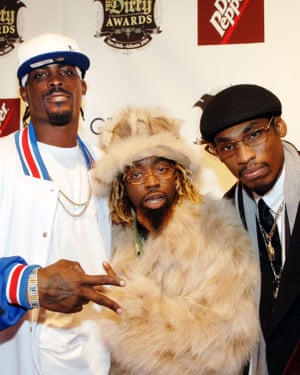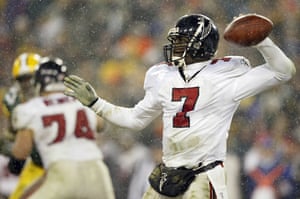Playmaker, pioneer, pariah: Should Michael Vick be in the Hall of Fame? | Sport
Michael Vick’s career is one of the most fascinating, discomforting episodes in NFL history.
Playmaker. Pioneer. Pariah. Famous then infamous. He is one of the most electric players to step foot on a field, and also one of the most controversial. An otherworldly talente who helped redefine what the quarterback position could be and helped pave the way for the likes of reigning MVP Lamar Jackson, Vick is as notorious for having served 21 months in federal prison after he pleaded guilty to his involvement in a dogfighting ring.
It’s been five years since Vick retired from the league – or rather was retired by the league – which means he is now eligible for the Pro Football Hall of Fame. Responding to a Twitter question last week asking whether Vick should be a first-ballot selection, Jackson responded “This can’t be a question.”
Jackson was putting voice to a generational divide. By the old rules, Vick is way off the Hall of Fame pace. But to a section of players and fans, Vick is the reason why they started watching or playing football. It’s why someone like Jackson was so convinced he could play the most important position on the field. And it’s why coaches believed in him. Why they saw he shouldn’t move from quarterback to running back or wide receiver because he was the best athlete on the field. Instead they saw he should be playing quarterback precisely because he’s the best athlete on the field.
Without Vick, we may never have seen a full embrace of the pace-and-space style at the NFL level, which makes him and his career a fascinating test case for the Hall and its voters.
Whether or not he should be enshrined in Canton is as much a discussion about what you think the Hall represents rather than solely an examination of the player himself. Are we rewarding the best players? The best careers? The biggest winners? Are we treating it as a museum, using the classic adage can you tell the story of the game without him? to determine who gets in and who is kept out?
Every voter uses his or her own judgment, which makes the whole thing murky.
Vick only hits one of the above categories. Since his playing days, he has emerged as the ultimate stats-v-eye-test guy. Ask a defender from his era which quarterback they feared playing the most and Vick will be right at the top of the list.
One story stands out above all:
Remember the 2002 Super Bowl champion Tampa Bay Buccaneers, the team of Warren Sapp and John Lynch fame? The Bucs, along with the Ravens, were the most fearsome defense in the NFL in the early 2000s. It was a group littered with future Hall of Famers and All-Pros galore. In game-planning for Vick for a top-of-the-NFC-South clash, the Bucs defense honed in on the Falcons third-down package. They pulled up the tape. Boom. Boom. Boom. Vick was a blur. He was carving up defenses with his arm and legs. It didn’t just look easy, it looked like the quarterback was having fun. “Yo!” Simeon Rice, a four-time All-Pro called from the back of the room, “Is this a damn highlight reel?” It was not.
Warren Sapp summed it up succinctly: “The best football I had ever before seen in my life.”
Whereas the greatness of most quarterbacks is a little in the shadows – the game planning, the audibles, the setting and resetting of protections, the little wins that lead to a big completion – Vick’s was visceral. He was quicker and he could throw the ball farther than anyone. And he knew it, too, playing with all the swagger and style that made him a cross-cultural icon to a generation of fans who were done with the stodgy, conservative quarterbacks they were used to.

Vick played in Atlanta at a time when the city was the center of the hip-hop universe. This was a place of Outkast and Ludacris and Lisa Lopes. “We did something great for the city at a time when times was changing,” Vick said in 2017. Atlanta fell in love with Vick the personality as much as the player.
He became the face of EA Sports’ Madden NFL franchise. It was a seismic moment, indicating a readiness from the masses for a black quarterback as the face of the NFL. “Something black America had been awaiting for decades,” David Dennis Jr wrote for the Undefeated.
Vick and his Madden legend are inseparable. He was such a glitch in Madden 2004 that EA was forced to change the entire mechanics of the game to compensate in 2005. Yet Vick’s real-life career numbers and accolades underwhelm compare to his virtual duplicate. Yes, he finished his career with 6,109 rushing yards, a monster total for any player, let alone a quarterback. But as good as he was with his legs, as revelatory as his playing style may have been, Vick was never listed as an All-Pro, never won an MVP award and never played in a Super Bowl. His career record as a starter is only a tick above .500, and he completed just 56% of his pass attempts in a 13-year career. Those are crude numbers that lack nuance, but they’re also the kind of thing voters usually look for in their HOF quarterbacks.

Joe Montana, Jim Kelly, John Elway, Dan Marino, Steve Young, Troy Aikman, Warren Moon, Brett Favre and Kurt Warner are the only quarterbacks voted into the Hall of Fame this century. Peyton Manning will be elected to the Hall of Fame in 2021, the same year as Vick. Tom Brady and Drew Brees will join them at some point in the next decade. All but Moon played in Super Bowls; all but two won a championship. And none of them carried Vick’s baggage.
Wading into Vick’s criminal record is a moral quagmire. When Vick was announced as one of four “legends captain” at the 2020 Pro Bowl, it was greeted by a petition signed by nearly 900,000 people. Vick has been able to rehabilitate himself within the game: he is a mentor to a bunch of young players and, as evidenced by the Pro Bowl, has been welcomed back by the league office as an official “legend”. But he will never be forgiven by large swaths of the public for his involvement in dog fighting.
To answer the earlier question: You cannot tell the story of the NFL without Michael Vick. He is one of the most important players of this century, if not one of its best. But his career will be as much remembered as a series of whys and ifs the further we are removed from the highlights and the video games. And that feels right. His absence from the Hall of Fame will speak more appropriately to his career than his induction ever would.
